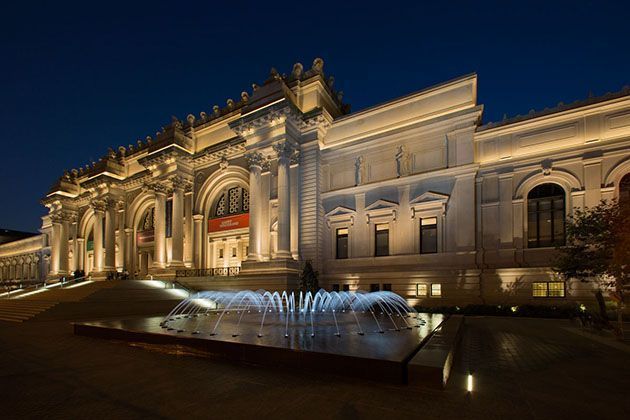
Best Kept Secrets of the Metropolitan Museum of Art
Get kid-friendly activities sent to you!
Get the Best Kid-Friendly Activities
Sent to You Weekly!

The Crypt Gallery
The heavily-traveled Great Stairs are one of the most-photographed features of the museum. But few visitors explore the so-called Crypt Gallery tucked away under the staircase. Until recently, it was a storage area, but now brick archways and rough-hewn granite surround works in gold, ivory, and stone from the Byzantine period in Egypt. This little spot doesn’t see much foot traffic, and kids will like pretending they’re Indiana Jones—once you explain who that is!
Ambrym Slit Gong
The galleries of the Arts of Africa, Oceania and the Americas aren’t necessarily what tourists flock to. But they have some pretty amazing holdings, among them a slit gong from the Pacific island of Vanuatu. At 14 feet high, it’s carved from a breadfruit tree and is one of the largest freestanding musical instruments in the world. The slit represents the mouth of ancestors.

“Madonna and Child” by Duccio di Buoninsegna
Older kids tend to think in terms of money. One of my charges wanted to know how much it would cost to buy everything in the museum. That I can’t answer, but if your kid asks to see the most expensive thing in the museum, it’s a little painting. Don’t be fooled by its size (11 x 8-3/4 inches including the frame, which shows burn marks from worshipers’ candles). Dating to the 1300s, the museum paid $45 million for it.
Know Before You Go
The museum has fairly strict security policies. No backpacks are allowed in; they will need to be relinquished at coat check. So while your kid may look adorable toting that Dora knapsack, best to just leave it at home. Using writing instruments of any type is prohibited in the exhibit halls, as is eating and drinking. Still photography, without a tripod or flash, is OK, but videos aren’t. So if your child is going with the intent to parlay the visit into a school project, he’s going to have to do it without sketching or taking notes.
Strollers are permitted in most areas, but double and jogging strollers are prohibited.
While the museum has four spots to nosh, the one best suited to kids is the cafeteria behind the Medieval Hall on the first floor.
Does the museum seem overwhelming, even with our cheat sheet? If you’re still not quite sure where to begin, consider a guided tour. They’re free! And since they can be done one-on-one with your family, you know the guide will keep it at a kid-friendly level.
RELATED: Find the most kid-friendly museums in our area.
What about the Cloisters?
The Cloisters Museum and Gardens is a branch of the Metropolitan Museum of Art devoted to the art and architecture of medieval Europe, housed in a French monastery in Fort Tryon Park in northern Manhattan. A ticket to the main branch gets you into the Cloisters on the same day, and vice versa. Given the distance, though, it would be a pretty exhausting effort to do both.
Should you take the kids? Not unless they’re into religious artwork. Yes, the exhibits are inspiring, and the grounds are gorgeous. But even perfect weather, vibrant flowers, and a view of the Hudson couldn’t keep my tweens from fussing. The highlight of their day was spotting a groundhog on the walk back to the subway station. The Cloisters are for sure worth a visit…just make it a grown-ups only outing. And when you do go, a tip: the walk from the Cloisters back to the A train is uphill. Do yourself a favor and take the M4 bus (it stops right at the exit) one stop back to the 190th Street station.
DETAILS:
Location:
1000 Fifth Avenue, Upper East Side, Manhattan
Phone:
212-535-7710
Prices:
A pay-what-you-wish policy is in place. Recommended admission, though, is $25; $17 for seniors; $12 for students; Free for younger than 12 with an adult.
Hours:
Sunday–Thursday 10am–5:30pm; Friday and Saturday 10am–9pm. Closed Thanksgiving Day, December 25, January 1, and the first Monday in May.
Website:









